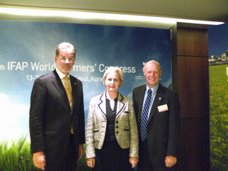The example of the Mavindini cooperative in Kenya illustrates how a cooperative has initiated and facilitated the way out of the cotton crisis for their members by joined reflection, study tours, by their potential to attract more important traders and by their ability to immediately provide adapted extension services (whereas the official extension services mainly bring the general messages on classic crops). The membership remains however quite limited up till today, indicating high thresholds to access for vulnerable farmers.
“A member of Mavindini multi-purpose cooperative in South Eastern Kenya tells about a special evolution in his life and within the cooperative. The cooperative was formed in 2002 to improve the production and marketing of cotton (at a time when the cotton sub-sector was declining). Active membership shrunk to 69 (51 men and 18 women) and the cooperative couldn’t provide inputs anymore. Sons and daughters of many farmers went to work in big towns in Kenya and parents became dependent on their remittances. Support to the cooperative started in 2006 and facilitated a reflection between the farmers on possible ways to improve their livelihoods, insisting on opening their minds for alternatives. Options were limited because the area is regularly affected by drought. The cooperative decided to explore the collective marketing of mangoes as an alternative. 8-9 months of intensive seminars and a market orientation study visit to fruit exporters and processors in Mombasa took place. One exporter expressed interest in making a business deal with the cooperative. He offered a price of 10 shillings per piece of mango, 7 shillings more than the price paid by local middlemen. Unfortunately, only ten farmers had maintained their trees to the standards of the exporter. Therefore the cooperative supported to provide extension services for the maintenance of mango trees. In 2007, 46 additional farmers managed to sell to the exporter and in 2008 another 158 farmers joined. The member expects to earn 300,000 shillings in 2008 from mangoes compared to 40,000 shillings in 2007. He states: ‘I didn’t realise that a farmer can earn more than people who are employed in the big cities. I am now better off than many people there’.”
Tuesday, June 2, 2009
Subscribe to:
Post Comments (Atom)
Check these interesting contributions from other sites & blogs
- On Farmers Organization in Egypt
- Law on farmers Organizations in China
- Interview with FAO officials on Farmers Organizations
- Farmers use mobile phones
- comment of Kees Blokland on anti-CAP campaigning
- Poverty & growth blog of the World Bank
- Gapminder statistics visualized
- Guide for implementing ICT projects - iCommons december 2006
- Africa: tools of liberalisation - Patricia Daniel, University of Wolverhampton, England
- Business and the rural poor - Harvard Business School
- Profiling Asian Farmers Association members - Jan 4th, 2007
- Fiji Times report on AgriCord grants to Sugar Farmers - January 04, 2007
- Increasing Impact - marrying micro-credit and micro-insurance - The disconfort Zone, january 4th, 2007
- Programs that Fight Poverty - Institute for Advanced Technologies in Global Resilience - November 17, 2006
- University of Chicago Press Journals reports on GMOs - January 25, 2007
- Biotech crops to help reduce poverty - Kauser A Malik, in the Daily Times (Pakistan) January 25, 2007
- Why does China grow so fast - Michael Spence The Wall Street Journal 23 january 2007






No comments:
Post a Comment